.
25.06.2016

Rocket/Payload: A United Launch Alliance Atlas V 421 configuration rocket will launch the NROL-61 mission for the National Reconnaissance Office (NRO).
Date/Site/Launch Time: Thursday, July 28, 2016, from Space Launch Complex (SLC)-41 at Cape Canaveral Air Force Station, Florida.
Webcast: Look for details about the launch broadcast closer to launch day.
Mission Description: The mission will be launched for the National Reconnaissance Office in support of national defense.
Launch Notes: NROL-61 will mark ULA’s sixth launch of 2016 and the 109th since the company was founded in 2006. It also will be the sixth Atlas V to launch in the 421 configuration.
Quelle: ULA
-
Update: 10.07.2016
.
Mystery payload for spy satellite agency launching aboard next Atlas 5
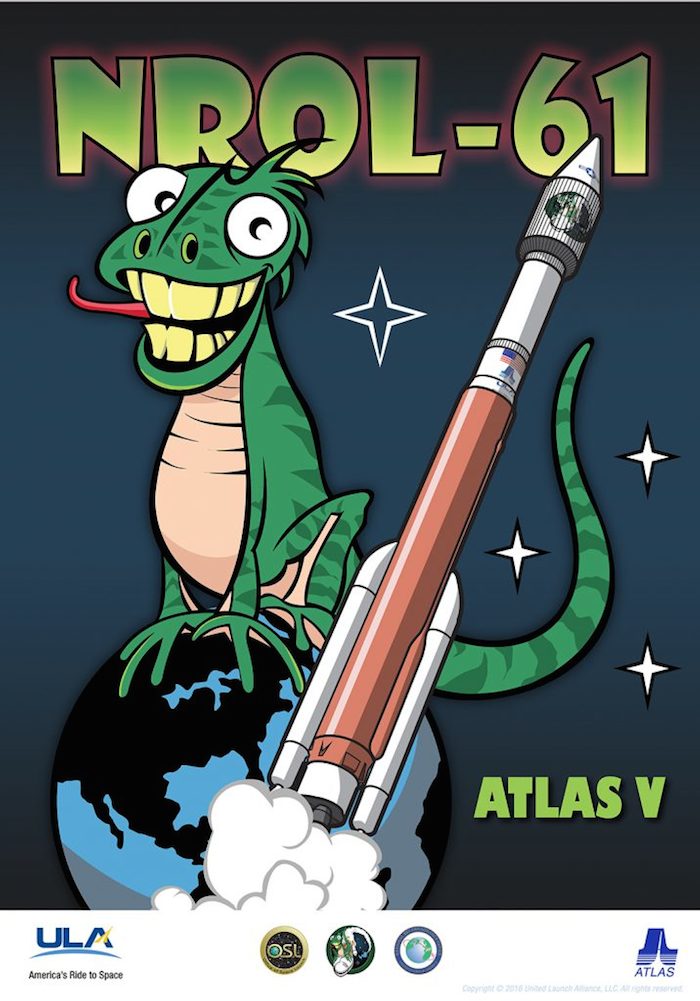
The NROL-61 poster. Credit: United Launch Alliance
CAPE CANAVERAL — United Launch Alliance is preparing an Atlas 5 rocket to boost an undercover satellite into orbit for national security later this month.
Details are scarce and informed speculation is nonexistent in the lead up to launching the clandestine NROL-61 mission for the U.S. National Reconnaissance Office.
Liftoff is scheduled for July 28 during a four-hour unclassified launch period of 8 a.m. to 12 noon EDT (1200-1600 GMT).
Stacking of the rocket began Friday, July 8.
Satellite-deployments for the NRO are a mainstay in the U.S. launch industry as the agency sends up fresh replacements for its constellations of imaging, eavesdropping, surveillance and data-relay spacecraft.
This will be the 45th launch for the NRO in the past 20 years.
Although the NRO never discloses details about its operational satellites or the missions they will perform in orbit, experts who track the launches invariably figure out ahead of time what kind of payload is going up.
Repeat launches using the same variant of rocket time and again is one of the easiest clue to solving the mystery of a given NRO flight.
But NROL-61 is unique. Never before has the NRO used an Atlas 5 rocket in its 421 configuration with a four-meter-wide payload shroud and two solid rocket boosters.
That indicates something new — either a new generation that advances an existing type of NRO spacecraft or else something completely different from current methodologies.
“Inconclusive,” said Ted Molczan, a respected expert in satellite observing. “Looks like we will have to wait for the NOTAM coordinates.”
.

The NROL-61 mission patch. Credit: NRO
Understanding what NROL-61 will require the experts to wait for the NOTAMs — notices sent to airmen a few days before liftoff detailing hazard areas for the launch that will depict the rocket’s trajectory, thereby narrowing the list of possible payload candidates.
“If headed northeastward, then probably SDS/Quasar. If due east, then apparently some new type or model of GEO sat,” Molczan said.
Since this Atlas 5 is on the low-end of payload capacity scale, a data-relay satellite going into a highly elliptical, highly inclined Molniya-type orbit currently used by such NRO spacecraft or a bird for similar uses headed for geosynchronous transfer orbit are hypothetical possibilities.
Today’s NRO communications craft that route transmissions from polar-orbiting imagery-collection satellites are known in the public sphere as the Satellite Data System with the codename Quasar.
Experts caution, however, clues about this enigmatic satellite could remain murky until hobbyist observers find it in orbit and watch its behaviors to truly solve the puzzle.
In preparation for the launch, the 64th for an Atlas 5 and United Launch Alliance’s 109th, workers Friday morning delivered the 106.6-foot-long, 12.5-foot-diameter first stage to Cape Canaveral’s Vertical Integration Facility, used a crane to lift it upright and then placed it aboard the mobile launch platform to accomplish LVOS — Launch Vehicle On Stand.
.

File photo of an Atlas 5-421. Credit: United Launch Alliance
The stacking will continue by attaching the twin solid rocket boosters and mating the barrel-like interstage and the single-engine Centaur upper stage. The payload, already encapsulated in nose cone, will be mated in the final week before flight.
The completed launcher will roll to the Complex 41 pad on July 26.
It will be the NRO’s third launch this year, following a Delta 4 flight in February from Vandenberg Air Force Base in California that placed a radar-imaging satellite in a retrograde orbit and a Delta 4-Heavy in June from Cape Canaveral that flew to geosynchronous orbit to deploy an eavesdropping craft.
For the Atlas 5, it will be the fourth of 10 launches planned in 2016. It has another hush-hush payload to launch in December, the NROL-79 mission, from Vandenberg.
Quelle: SN
-
Update: 22.07.2016
.

...
Update: 26.07.2016
.
Nice forecast for Atlas V launch Thursday from Cape Canaveral

United Launch Alliance on Tuesday will roll a 195-foot-tall Atlas V rocket to its pad in preparation for a Thursday morning launch from Cape Canaveral Air Force Station.
Liftoff from Launch Complex 41 with a National Reconnaissance Office mission is targeted for 8:37 a.m. Thursday.
There's an 80 percent chance of favorable weather, with a rain shower possible. The full launch window for the classified mission labeled NROL-61 won’t be disclosed, but it is believed to last about an hour.
The weather odds are the same if the launch is delayed until Friday morning.
ULA and the Air Force’s 45th Space Wing on Monday completed readiness reviews giving go-aheads to proceed toward a first launch attempt on Thursday.
The rocket is expected to start rolling at 9 a.m. Tuesday from its processing tower to the pad, a distance of about a third of a mile.
The Atlas V is flying with two solid rocket boosters strapped to the first stage powered by a Russian-made RD-180 engine.
Quelle: Florida Today
-
Update: 27.07.2016
.
Preview: New satellite for spy agency awaits launch into space Thursday

File photo of Atlas 5-421 rollout. Credit: ULA
CAPE CANAVERAL — An Atlas 5 rocket carrying a classified national security satellite was rolled to the launch pad this morning for Thursday’s flight to bolster the U.S. intelligence-gathering space architecture.
Liftoff will occur at 8:37 a.m. EDT (1237 GMT). The duration of the day’s usable launch window remains classified.
Weather forecasters expect favorable conditions for liftoff, placing 80 percent odds on launching. The only concern is a stray coastal shower impeding the rules.
United Launch Alliance will perform the satellite-delivery mission using a 421-configured Atlas 5 rocket that is distinguished by a nose cone 14 feet in diameter and two solid-fuel boosters for added takeoff thrust.
The rocket will head eastward across the Atlantic on a 99-degree flight azimuth to deploy the NROL-61 payload for the National Reconnaissance Office, the government agency responsible for the country’s spy satellites.
The satellite’s purpose and final orbit have not been disclosed.
The NRO was created in 1961 and operated in total secrecy as a black organization until its existence was declassified in 1992. It began acknowledging in advance the launches of its payloads in 1996.
Today, the agency operates imaging and eavesdropping spacecraft, naval surveillance birds and data-relay satellites for the constellations.
“NRO systems fly from hundreds to thousands of miles from Earth. They provide policymakers and warfighters a unique perspective, worldwide reach and the flexibility only possible through space-based access,” said NRO Director Betty Sapp.
Atlas 5 has performed a dozen missions for the NRO since 2007 among its 63 flights overall dating back to 2002. But the NRO has never used a 421 version of the workhorse.

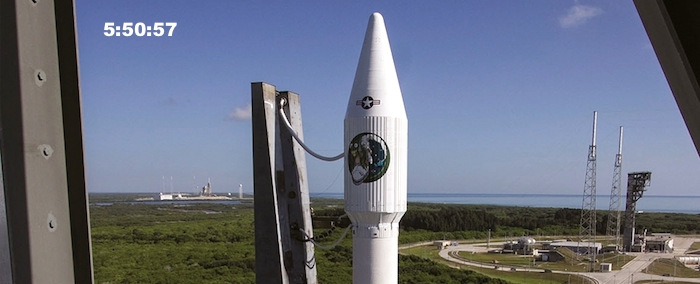
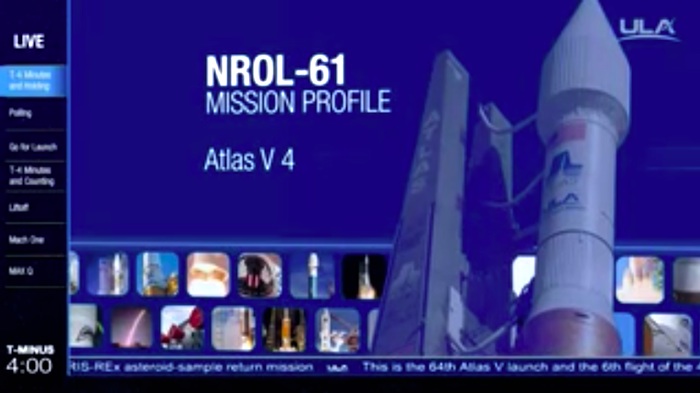
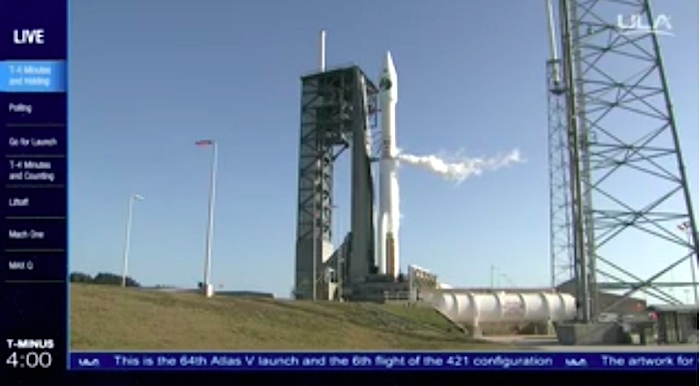








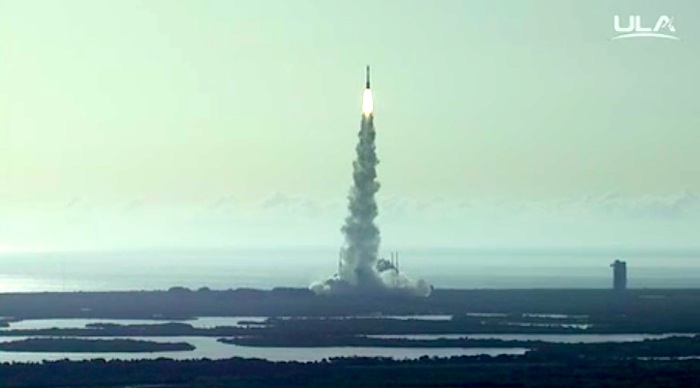



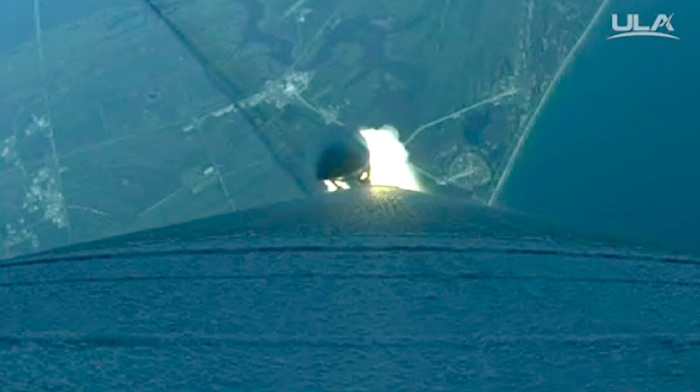
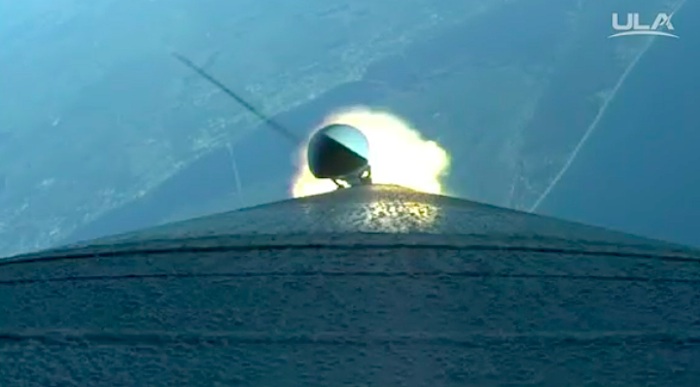

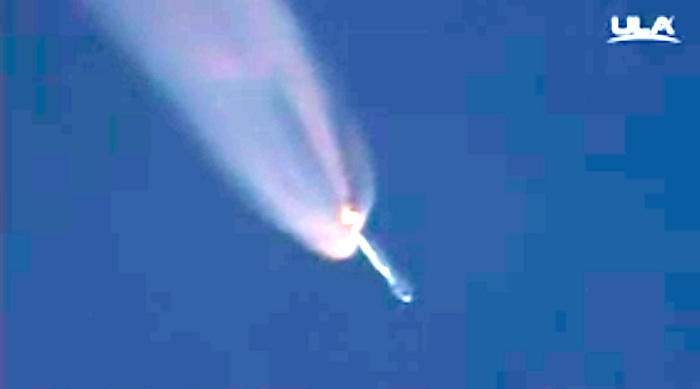
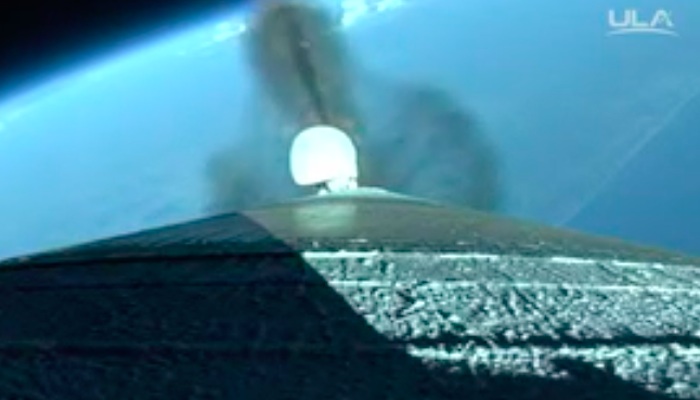


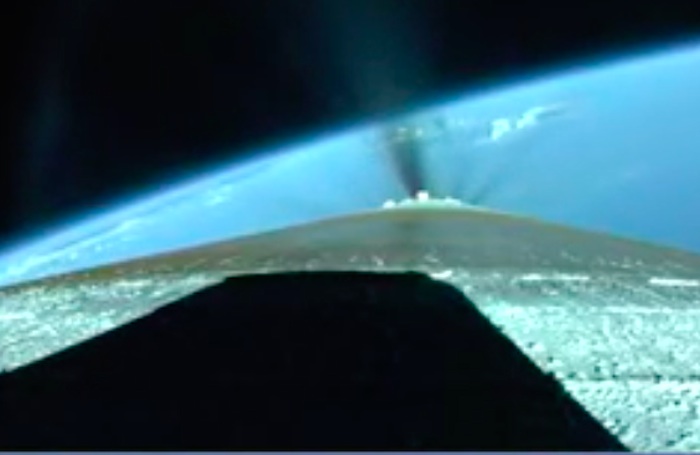


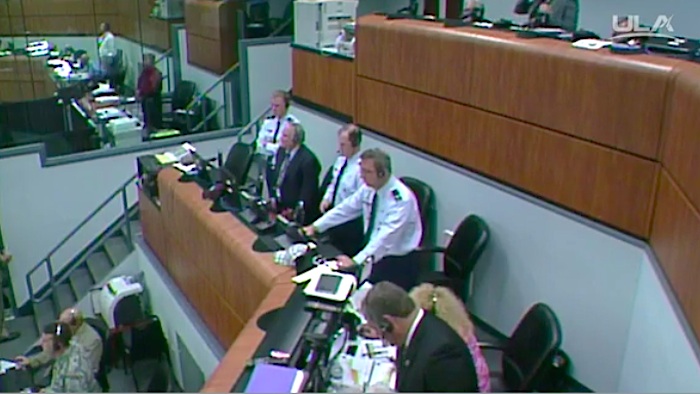


For United Launch Alliance, Thursday marks the company’s 23rd flight in service to the NRO, the third just this year and 109th mission overall since 2006.
Officials held the Launch Readiness Review on Monday to grant final approval to proceed with the mission as scheduled.
The Atlas 5 rocket, assembled aboard a mobile launch platform inside the Vertical Integration Facility, was rolled out to the pad at Cape Canaveral’s Complex 41 this morning.
The slow drive from the 30-story assembly building to the launch pad, which began at 9:05 a.m., used a pair of specially-made “trackmobiles” to carry the rocket’s 1.4-million pound launching platform along rail tracks for the 1,800-foot trip.
Countdown clocks will begin ticking early Thursday for the seven-hour sequence of final testing and fueling to launch.Tanking begins about two hours before liftoff to load 66,000 gallons of liquid oxygen and liquid hydrogen into the vehicle.
The NROL-61 launch will be the 64th Atlas 5 flight and the fourth of 10 planned this year.
It also marks the 80th rocket launch from Cape Canaveral’s Complex 41. Since December 1965, the pad has hosted 27 Titan launches and 52 Atlas 5s.
Quelle: SN
-
Update: 22.15 MESZ

...
Update: 28.07.2016 / 8.45 MESZ
.

Quelle: ULA
...
Update: 14.15 MESZ Lift Off LIVE-Frams:
.


























Quelle: ULA
-
Update: 29.07.2016
.
45th Space Wing supports successful Atlas V NROL-61 launch

The U.S. Air Force’s 45th Space Wing supported United Launch Alliance’s successful launch of the NROL-61 spacecraft aboard an Atlas V rocket from Space Launch Complex 41 at Cape Canaveral Air Force Station, Fla., July 28, 2016, at 8:37 a.m. ET. Before any spacecraft can launch from Cape Canaveral Air Force Station, a combined team of military, government civilians and contractors from across the 45th Space Wing provide the mission assurance to ensure a safe and successful lift-off for range customers. (Photo/United Launch Alliance)
CAPE CANAVERAL AIR FORCE STATION, Fla. --
The U.S. Air Force’s 45th Space Wing supported United Launch Alliance’s successful launch of the NROL-61 spacecraft aboard an Atlas V rocket from Launch Complex 41 here July 28, 2016, at 8:37 a.m. ET.
The ULA Atlas V rocket is carrying a national security payload for the U.S. National Reconnaissance Office.
Before any spacecraft can launch from Cape Canaveral Air Force Station, a combined team of military, government civilians and contractors from across the 45th Space Wing provide the mission assurance to ensure a safe and successful lift-off for range customers.
According to Brig. Gen. Wayne Monteith, 45th Space Wing commander and mission Launch Decision Authority, this launch is the culmination of many long hours and hard work by the entire mission team.
“Our team diligently prepared for this important mission through a series of rigorous rehearsals, readiness reviews and pre-operational checkouts,” he said. “This mission, once again, clearly demonstrates the successful collaboration we have with our mission partners at NRO, Space and Systems Missile Center and ULA as we continue to shape the future of America's space operations. This successful launch helps to ensure that vital NRO resources will continue to bolster our national defense while showcasing why the 45th Space Wing is the ‘World's Premiere Gateway to Space.’”
Quelle: USAF
4671 Views
